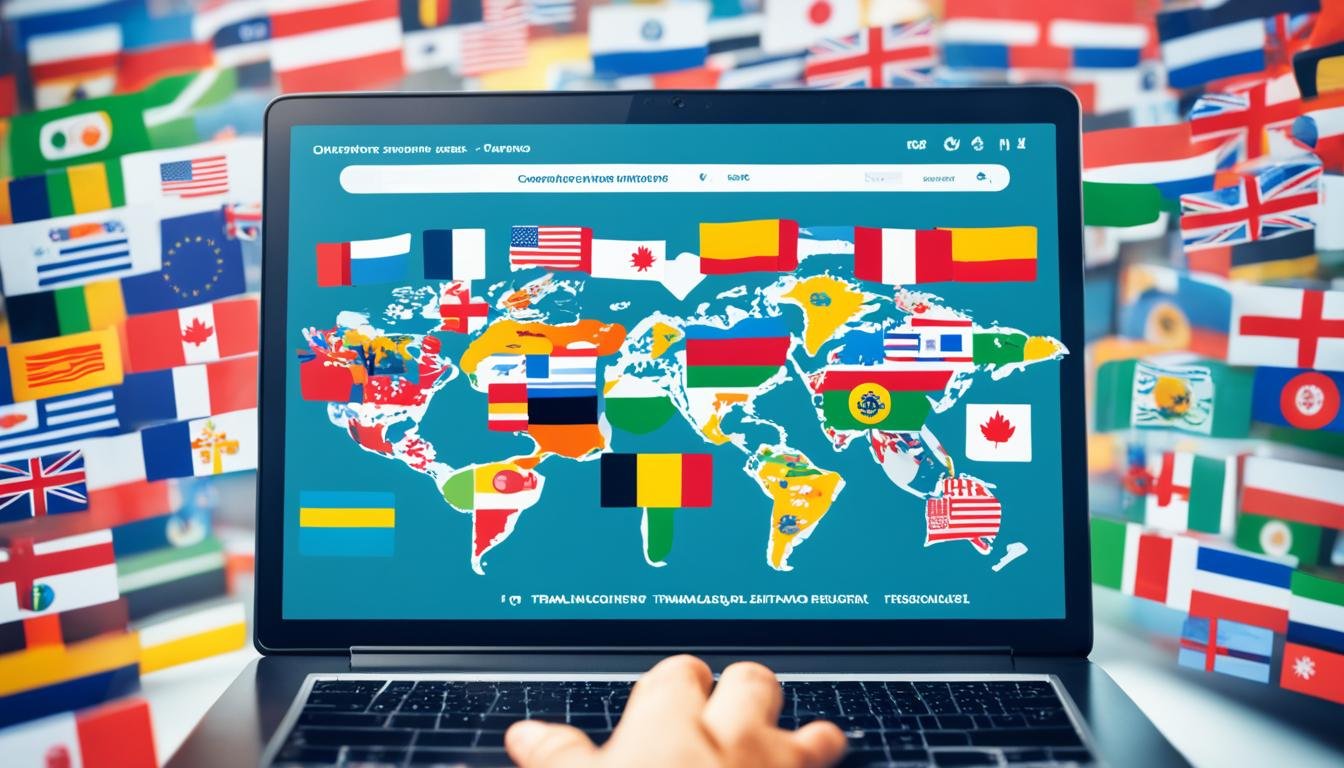In today’s world, the need for translation services is growing fast. This opens up chances for you to earn money online by using your language skills. Whether you’re good with two languages or a pro in linguistics, there are many ways to make money translating online. This guide will show you the different paths in the translation field, from part-time jobs to full-time careers. Learn how to use online services to pay for your skills and make the most of your talents.
Key Takeaways
- Leverage your language skills to earn money translating online.
- Explore various opportunities in the growing translation market.
- Understand how to effectively get started in the translation industry.
- Utilize online platforms for greater visibility and job access.
- Build a professional profile that attracts clients and gigs.
Understanding the Demand for Translators
The global demand for translators is growing fast. Companies are reaching out to international markets, and they need bilingual pros. These pros help connect with different audiences in fields like marketing, healthcare, and tech.
This rise in demand boosts the freelance translator income. It opens up great earning chances for those in the field. Freelancers get to work in a strong market that values good translation work.
Below is a table summarizing some key trends in the translation jobs market:
| Industry | Growth Percentage | Average Pay per Hour |
|---|---|---|
| Marketing | 15% | £35 |
| Healthcare | 20% | £30 |
| Technology | 25% | £40 |
The table shows that many industries are growing fast. This makes the translation jobs market more competitive. Aspiring translators should grab these chances to improve their skills and grow their careers.
Popular Online Translation Job Opportunities
Many people want to make money by doing freelance translation work. It’s a great way to use their language skills. Websites like Fiverr and PeoplePerHour connect translators with clients.
Tomedes is also a top site for translation gigs for cash. Here, freelancers can find different types of work, like translating documents or interpreting in real-time. Using these sites well can lead to a steady flow of work and more clients.
- Fiverr
- PeoplePerHour
- Tomedes
- ProZ
- Upwork
These sites offer many job listings. Translators can pick projects that match their skills and interests. With hard work and a good plan, freelancers can do well in the online translation world.
Ways to Make Money Translating
Translators can earn money in ways beyond traditional jobs. By exploring translation income sources, they can use their skills well. Here are some ways to make money:
- Create and sell translated books or articles to reach more people.
- Make online courses to teach languages or translation skills, sharing valuable knowledge.
- Offer tutoring to language learners, helping them get better.
- Sell glossaries or dictionaries for specific industries or fields.
- Work with businesses for translation services on demand, fitting your schedule.
Considering these ways to make money translating can increase translators’ income. Each method has its own benefits and targets different markets. This creates strong paths to success.
| Method | Overview | Potential Earnings |
|---|---|---|
| Sell Translated Works | Translate and publish books or articles. | Varies, can be substantial with popularity. |
| Online Courses | Teach languages or translation online. | £100-£500 per course. |
| Tutoring Services | One-on-one sessions with language learners. | £20-£50 per hour. |
| Glossary Sales | Create and sell specialized glossaries. | £10-£100 per item. |
| On-Demand Services | Work as a freelancer for businesses. | £30+ per project. |
Make Money Online with Translate: Platforms to Use
Many people want to make money by translating online. There are several popular platforms that connect freelance translators with clients. These platforms are great for translators to show off their skills and find work.
Here are some top platforms for translators:
- Lionbridge: This platform offers a wide range of translation services. It has a simple application process and offers various projects. It’s perfect for those new to translation.
- Unbabel: Unbabel uses AI and human translators for quality work. It works with many industries. This makes it ideal for translators looking for steady work.
- Rev: Rev focuses on transcription, captioning, and translation. Its easy-to-use interface helps translators find and manage jobs. It’s a favorite among freelancers.
Each platform has its own way of paying translators. Some pay by project, others by the hour, and some by the words translated. It’s important for translators to know these differences when picking a platform.
When choosing a platform, think about the type of translation you want to do. Whether it’s legal documents, marketing materials, or technical texts, the right platform will connect you with the right clients. Using these popular platforms can help you build a successful freelance career and follow your passion for languages.
| Platform | Specialty | Payment Structure | Best For |
|---|---|---|---|
| Lionbridge | General translation | Project-based | Diverse work opportunities |
| Unbabel | AI & Human collaboration | Fixed rates | Specialized fields |
| Rev | Transcription & translation | Pay-by-project | Quick project management |
Starting Your Freelance Translation Career
Starting a starting freelance translation career opens up many chances. It’s important to plan well to overcome challenges. Here are key steps to lay a strong base for your career.
- Build a Portfolio: Show off your translation work to draw in clients. Include various texts to show your range.
- Create a Professional Profile: Join top freelance sites. Emphasize your skills, languages, and any certifications you hold.
- Network Within the Industry: Be active in forums, social media, and at translation events. Making connections can open new doors.
- Establish Credibility: Think about getting certifications from trusted places. This can make you more credible professionally.
These freelance translator tips guide you in starting your translation business startup. Focus on quality and building connections for growth in this competitive area.
| Step | Description |
|---|---|
| Step 1 | Build a portfolio with diverse translation samples. |
| Step 2 | Create a detailed profile on freelance platforms. |
| Step 3 | Network through social media and events. |
| Step 4 | Obtain certifications to strengthen credibility. |
Crafting a Compelling Translator Profile
A well-made translator profile can really help you stand out to potential clients. It’s key to focus on your language skills. Show off your fluency in languages and any special areas like legal or medical translation. These can attract clients looking for specific services.
Adding previous translation samples lets clients see your skills up close. Make sure these samples are your best work and match the projects you want to do. A good profile lets you tell your story. Talk about your love for languages and your dedication to quality in every job.
Client reviews can make you look more trustworthy. Ask happy clients to share their thoughts, which can boost your profile. A complete profile shows off your skills and builds trust with potential clients. Always keep your profile fresh to show off your growing skills and keep it relevant.

- Clear and concise summary of your skills and experience
- Relevant work samples tailored to your target audience
- Client testimonials that highlight your strengths
- Professional photo to create a personal connection
- Continuous updates to reflect your evolving skills
| Element | Description |
|---|---|
| Language Skills | Clear listing of languages and proficiency levels |
| Work Samples | Representative samples that showcase your best work |
| Client Reviews | Positive feedback from past clients to build credibility |
| Personal Branding | Unique persona that demonstrates your translation style and approach |
| Updated Profile | Regularly refreshing content to reflect new skills and experiences |
What Types of Documents Can You Translate?
The translation industry offers many opportunities across various document types. Knowing what documents to translate can boost a translator’s career and earnings. Here are some popular categories:
- Literary texts: Includes novels, poetry, and short stories that need a deep understanding of style and nuance.
- Legal documents: Covers contracts, agreements, and legal briefs. It’s crucial to be precise in this area.
- Technical manuals: Needed for industries like engineering and IT, where specific terms are key.
- Websites: Translating websites helps businesses reach more people and grow their brand.
- Marketing materials: Includes brochures, ads, and social media posts that need creativity and cultural insight.
Specializing in certain industries can lead to more steady work and better pay. This shows the value of knowing different types of documents to translate well. The need for document translation services is growing, letting translators find niches that match their skills and interests.
| Document Type | Key Skills Required | Potential Earnings |
|---|---|---|
| Literary Texts | Creative writing, cultural sensitivity | Varies greatly, typically high |
| Legal Documents | Legal terminology, accuracy | High, often per hour or per page |
| Technical Manuals | Technical knowledge, attention to detail | Moderate to high, often project-based |
| Websites | SEO knowledge, language fluency | Varies, based on scope and audience |
| Marketing Materials | Creativity, cultural knowledge | Moderate to high, depending on campaign |
How to Successfully Manage Translation Gigs
Managing many translation gigs can be tough without good organization. To do well, you need to manage your time well and talk clearly with clients. Here are some tips that can really help:
- Prioritize Tasks: First, figure out what needs to be done quickly. Then, start with those tasks. This way, you meet deadlines on time.
- Create a Dedicated Workspace: Make a special place to work without distractions. Having a specific area helps you stay focused and productive.
- Use Project Management Tools: Tools like Trello or Asana are great for keeping track of tasks, deadlines, and talking to clients.
- Maintain Clear Communication: Keep clients updated on your work and any problems. Being open builds trust and keeps clients happy.
- Set Realistic Deadlines: Know what you can do before you take on projects. Don’t take on too much to keep your work quality high.
To get better at managing translation gigs, think about using a table to keep track of your projects and deadlines:
| Project Name | Client | Deadline | Status |
|---|---|---|---|
| Technical Document | ABC Corp | October 15 | In Progress |
| Marketing Brochure | XYZ Ltd | October 20 | Pending Review |
| Website Localization | Global Tech | October 25 | Not Started |
Using these tips can make your work flow better and help you handle translation gigs well. As you take on more projects, improving how you work will help you grow professionally.

Building a Professional Network as a Translator
Creating a professional network for translators is key to moving up in the field. Using both online and offline methods can really boost your connections in the translation industry.
Starting to network for freelance translators means joining groups like the American Translators Association (ATA) or the Chartered Institute of Linguists (CIOL). These groups offer resources, training, and special job listings. They are crucial for growing your career.
Being active on social media helps translators meet others and find clients. Sites like LinkedIn and Facebook have groups for translation pros. Here, members can share advice, tips, and job leads.
Going to industry events like conferences and workshops is great for making real connections. These events offer learning chances through panels and networking. Talking with others and leaders can lead to new projects and jobs.
To wrap it up, building a strong professional network takes effort and being active. Here’s a quick guide:
| Networking Strategy | Description |
|---|---|
| Join Associations | Access resources, job listings, and professional development. |
| Engage on Social Media | Connect with fellow translators and potential clients. |
| Attend Conferences | Build face-to-face relationships and learn from experts. |
| Participate in Online Forums | Get advice and share experiences with other translators. |
Good networking makes you smarter and opens up new chances. Having a supportive network helps you succeed in the translation world.
Expanding Your Skills for Higher Earnings
To make more money in translation, it’s key to keep learning new skills. Today, translators need to always be learning. This helps them find more work and earn more.
Think about taking courses in areas like legal, medical, or technical translation. Knowing these areas makes you more attractive to clients. Learning about digital marketing or content creation can also help. It makes you more useful to clients who need those skills.
Using the latest technology in translation tools can give you an edge. Tools like CAT software help you work better and earn more. Staying up-to-date with new trends keeps you relevant in a changing world.
- Take courses in specialized fields
- Learn about digital marketing strategies
- Familiarize yourself with modern translation tools
- Network within industry-specific communities
By working on expanding translation skills, translators improve their skills and set up for a successful career. This field is both challenging and rewarding.
Conclusion
Making money online through translation is a great way for those who speak multiple languages. This article covered different ways and strategies to help you start a successful freelance translation career. It showed how to find the right market and use the best platforms to make your translation business profitable.
Using your language skills and good management can help you do well in translation. It takes hard work and always learning, but you can earn a lot. By mixing your passion for translation with smart planning, you can achieve great things.
Whether you’re working on marketing materials, technical documents, or books, every project makes you better. Take advantage of the chances in the translation world. You might find a rewarding and profitable career is waiting for you.

